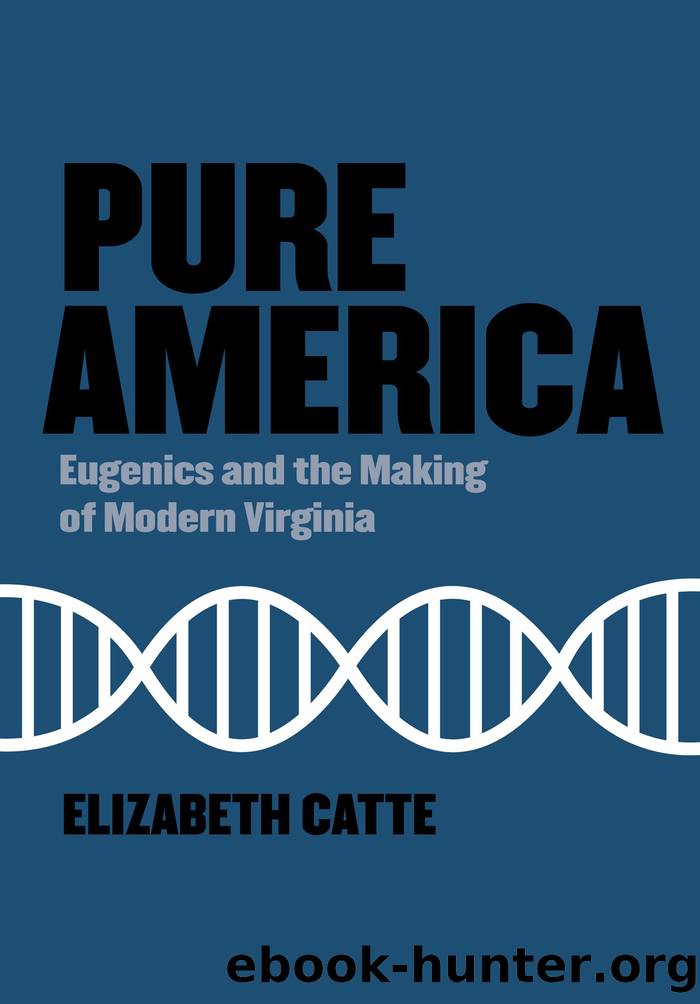Pure America by Elizabeth Catte

Author:Elizabeth Catte
Language: eng
Format: epub
Publisher: Belt Publishing
Published: 2021-04-14T16:00:00+00:00
In August 2017, white supremacists who had organized through the Unite the Right campaign gathered once again at their shrines in Charlottesville, including Thomas Jeffersonâs University of Virginia. They were demonstrating violent power for their own pleasure but also, much like their predecessors in 1924, seeking to make their connections with the past explicit.
Many people were perplexed by the groupâs fixation on Charlottesville. There was, of course, ongoing controversy over the cityâs two Confederate statues and their potential removal from public space. Hate groups that converged on Charlottesville throughout that summer were using the monuments as convenient shorthand for what they felt was their wider entitlementâa world ordered and marked by white power. This explanation was understandable, but also not entirely satisfying. After all, New Orleans had removed its statues three months earlier, and while there were protests and agitation, the city had not been swarmed.
Maybe it was the Trump administration, the way his presidency and party had emboldened white supremacists? Hadnât Iowa Republican Steve King, like a Madison Grant impersonator, been tweeting bullshit that past spring about how âwe canât restore our civilization with someone elseâs babies?â Wasnât Stephen Miller, one of Trumpâs key political advisors, also trapped in some armpit of ideas that hadnât been washed since 1924?
Perhaps there were even deeper and more clandestine forces at work in the white nationalist world, some power struggle within or among groups vying for dominant positions and claimed geographies. The rallyâs primary organizer, Jason Kessler, was a Charlottesville resident and a graduate of the University of Virginia. He had obvious ambitions toward securing an elevated place for himself among his fellow white supremacists.
As far as explaining why Unite the Right gathered in Charlottesville, none of these suggestions were wrong. They were just incomplete. That incompleteness became a void nervously filled with a familiar refrain: âThis is not who we are,â many people in Charlottesville said. âOur city will not tolerate division.â
For others, however, the white nationalist rallies were a more combustible version of what the city had long been. Charlottesville was a finely articulated white space moving through time, impinging upon Black lives, first with enslavement and violence, then through residential segregation, statues, and racial integrity laws. Eventually, a backlash to civil rights bled into urban renewal. Now, it seemed, the city had settled upon an intentional strategy of finding itself powerless in the face of the status quo. In 2005, for example, long-serving city councilor Kathy Galvin, then a member of the cityâs school board, responded to a report about racial inequality in the cityâs school systems:
The educational system is in and of itself neutral, even passive. White parents make it work for them through persistence and volunteer efforts. Black parents on the other hand expect the schools to work for them.⦠As a result, white kids learn to prepare for college due to their parentsâ advocacy and black kids are left in the lurch due to their parentsâ lack of knowledge or experience with a good education.
The city also sometimes felt like a hostage to wealth and private development.
Download
This site does not store any files on its server. We only index and link to content provided by other sites. Please contact the content providers to delete copyright contents if any and email us, we'll remove relevant links or contents immediately.
| Africa | Americas |
| Arctic & Antarctica | Asia |
| Australia & Oceania | Europe |
| Middle East | Russia |
| United States | World |
| Ancient Civilizations | Military |
| Historical Study & Educational Resources |
The Dawn of Everything by David Graeber & David Wengrow(1696)
The Bomber Mafia by Malcolm Gladwell(1620)
Facing the Mountain by Daniel James Brown(1546)
Submerged Prehistory by Benjamin Jonathan; & Clive Bonsall & Catriona Pickard & Anders Fischer(1452)
Wandering in Strange Lands by Morgan Jerkins(1419)
Tip Top by Bill James(1409)
Driving While Brown: Sheriff Joe Arpaio Versus the Latino Resistance by Terry Greene Sterling & Jude Joffe-Block(1370)
Red Roulette : An Insider's Story of Wealth, Power, Corruption, and Vengeance in Today's China (9781982156176) by Shum Desmond(1352)
Evil Geniuses: The Unmaking of America: A Recent History by Kurt Andersen(1346)
The Way of Fire and Ice: The Living Tradition of Norse Paganism by Ryan Smith(1329)
American Kompromat by Craig Unger(1307)
It Was All a Lie by Stuart Stevens;(1296)
F*cking History by The Captain(1292)
American Dreams by Unknown(1277)
Treasure Islands: Tax Havens and the Men who Stole the World by Nicholas Shaxson(1267)
Evil Geniuses by Kurt Andersen(1249)
White House Inc. by Dan Alexander(1207)
The First Conspiracy by Brad Meltzer & Josh Mensch(1167)
The Fifteen Biggest Lies about the Economy: And Everything Else the Right Doesn't Want You to Know about Taxes, Jobs, and Corporate America by Joshua Holland(1117)
